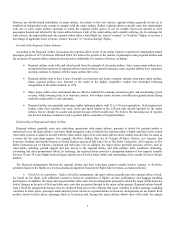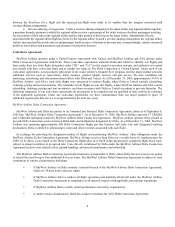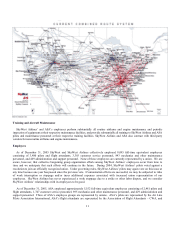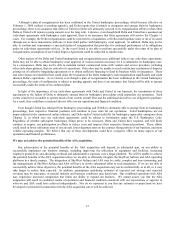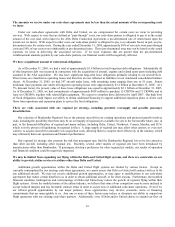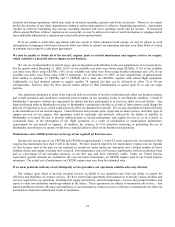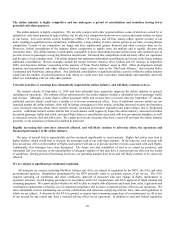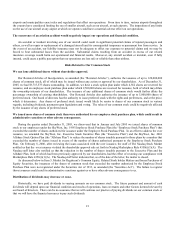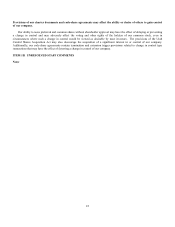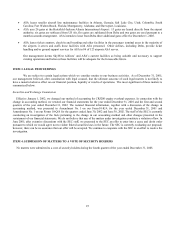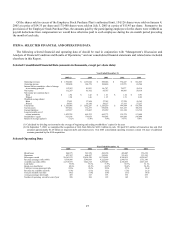SkyWest Airlines 2005 Annual Report Download - page 21
Download and view the complete annual report
Please find page 21 of the 2005 SkyWest Airlines annual report below. You can navigate through the pages in the report by either clicking on the pages listed below, or by using the keyword search tool below to find specific information within the annual report.17
terms acceptable to us, they may be allowed at any time to subsequently reduce the number of aircraft covered by our code-share
agreements. We also cannot assure you that we will be able to obtain the additional ground and maintenance facilities, including
gates, and support equipment, to expand our operations. The failure to obtain these facilities and equipment would likely impede
our efforts to implement our business strategy and could materially adversely affect our operating results and our financial
condition.
Delta and/or United may be restricted in increasing their business with us, due to “scope” clauses in the current collective
bargaining agreements with their pilots that restrict the number and size of regional jets that may be operated in their flight
systems not flown by their pilots. Delta’s scope limitations restrict its partners from operating aircraft with over 70 seats even if
those aircraft are operated for an airline other than Delta. We cannot assure that these scope clauses will not become more
restrictive in the future. Any additional limit on the number of regional jets we can fly for our code-share partners could have a
material adverse effect on our expansion plans and the price of our common stock.
Our business model depends on major airlines, including Delta and United, electing to contract with us instead of operating
their own regional jets. Some major airlines, including Delta, American, US Airways and JetBlue, own their own regional
airlines or operate their own regional jets instead of entering into contracts with regional carriers. We have no guarantee that in
the future our code-share partners will choose to enter into contracts with us instead of operating their own regional jets. Our
partners are not prohibited from doing so under our code-share agreements. A decision by Delta or United to phase out code-
share relationships and instead acquire and operate their own regional jets could have a material adverse effect on our financial
condition, results of operations or the price of our common stock.
Additionally, our code-share agreements limit our ability to provide airline services to other airlines in certain major airport
hubs of each of Delta and United. Under the SkyWest Airlines Delta Connection Agreement, our growth is contractually
restricted in Atlanta, Cincinnati, Orlando and Salt Lake City. Under the ASA Delta Connection Agreement, our growth is
restricted in Atlanta, Cincinnati, New York (John F. Kennedy International Airport), Orlando and Salt Lake City. Under SkyWest
Airlines’ United Express Agreement, growth is restricted in Chicago (O’Hare International Airport), Denver, Los Angeles, San
Francisco, Seattle/Tacoma and Washington D.C. (Dulles International Airport).
Increased labor costs, strikes, labor disputes and increased unionization of our workforces may adversely affect our
ability to conduct our business.
Our business is labor intensive, requiring large numbers of pilots, flight attendants, mechanics and other personnel. Labor
costs constitute a significant percentage of our total operating costs. For example, during the year ended December 31, 2005, our
labor costs constituted approximately 24.2% of our total operating costs. Increases in our unionized labor costs could result in a
material reduction in our earnings and affect our revenue under our code-share agreements. Any new collective bargaining
agreements entered into by other regional carriers may also result in higher industry wages and increased pressure on us to
increase the wages and benefits of our employees. Future agreements with unionized and non-unionized employees may be on
terms that are not as attractive as our current agreements or comparable to agreements entered into by our competitors.
ASA’s pilots, flight attendants and flight controllers are represented by unions, including: The Air Line Pilots Association,
International, the Association of Flight Attendants – CNA and the Professional Airline Flight Control Association. ASA’s pilots
and flight attendants are currently working under open labor contracts, and ASA has been in negotiations with respect to such
contracts since 2002 and 2003 respectively. Negotiations with unions representing SkyWest Airlines’ employees could divert
management attention and disrupt operations, which may result in increased operating expenses and lower net income. Moreover,
we cannot predict the outcome of any future negotiations relating to union representation or collective bargaining agreements.
SkyWest Airlines’ employees are not currently represented by any union; however, collective bargaining group organization
efforts among those employees occur from time to time. We recognize that such efforts will likely continue in the future and may
ultimately result in some or all of SkyWest Airlines’ employees being represented by one or more unions. Moreover, one or more
unions representing ASA employees may seek a single carrier determination by the National Mediation Board, which could
require SkyWest Airlines to recognize such union or unions as the certified bargaining representative of SkyWest Airlines’
employees. One or more unions representing ASA employees may also assert that SkyWest Airlines’ employees should be
subject to ASA collective bargaining agreements. If SkyWest Airlines’ employees were to unionize or be deemed to be
represented by one or more unions, negotiations with unions representing SkyWest Airlines’ employees could divert management


